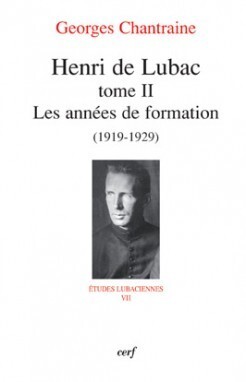- EAN13
- 9782204085892
- Éditeur
- Cerf
- Date de publication
- 15 mai 2009
- Collection
- LUBAC
- Série
- Henri de Lubac
- Nombre de pages
- 843
- Dimensions
- 21 x 13,5 x 4,3 cm
- Poids
- 1010 g
- Langue
- fre
Tome Ii, Les Années De Formation, 1919-1929, Henri De Lubac - Tome 2 Les Années De Formation (1919-1929)
Georges Chantraine
Cerf
Prix public : 44,00 €
Ce deuxième volume est consacré aux années de formation philosophique et théologique. À Pâques 1920, Henri de Lubac a prononcé ses voeux : sa vocation, fondamentale, résistera aux doutes et aux souffrances. À Jersey (1920-1923) et à Mongré (1923-1924), il s'enthousiasme pour la philosophie et lit les grands auteurs (Platon, Thomas d'Aquin, Blondel, Rousselot, Gabriel Marcel), élaborant des dissertations très articulées. À Ore Place (Hastings) et à Lyon-Fourvière (1924-1928), il fixe déjà, approuvé par le père J. Huby, des idées essentielles sur le Surnaturel, dont celle de sa gratuité. Des amitiés fructueuses naissent avec des jeunes gens de sa génération qui dureront toujours. Celle, toute d'affection, avec Robert Hamel est essentielle (le P. Chantraine nous ouvre la correspondance échangée entre eux, qui révèle un lien très fort entre les deux hommes) celles aussi, plus intellectuelles, avec Yves de Montcheuil et Gaston Fessard ou encore, pour citer ceux de la génération précédente, Valensin et Teilhard de Chardin. Ces liens mettent en lumière une caractéristique du futur cardinal : la fidélité qui traverse le temps et les épreuves. Nous assistons ici à la naissance d'une pensée et d'une oeuvre très tôt structurées, et fondées sur une réflexion globale faisant toujours le lien entre théologie et philosophie, une oeuvre dont le P. Balthasar disait la « cohésion organique ». Henri de Lubac est ici montré dans sa volonté constante d'être utile à l'Église, et aussi en être sensible et souffrant.--This second volume is devoted to Henri de Lubac's years of philosophical and theological studies. At Easter 1920, Henri de Lubac entered holy orders: his fundamental vocation resisted all doubts and suffering. In Jersey (1920-1923) and Mongré (1923-1924), he became passionately interested in philosophy and read the great authors (Plato, Thomas Aquinas, Blondel, Rousselot, Gabriel Marcel), writing elaborate dissertations. At Ore Place (Hastings) and in Lyon-Fourvière (1924-1928), he set down, with the approval of Father J. Huby, his essential ideas about the Supernatural, including that of its gratuitous nature. Propitious friendships were made with young people of his generation, which proved to be lasting. The particularly warm friendship with Robert Hamel was essential (Father Chantraine reveals their correspondence, which shows the strong bond between the two men) there were more intellectual friendships also with Yves de Montcheuil and Gaston Fessard or, some examples of the generation before, Valensin and Teilhard de Chardin. These relations highlight one of the future cardinal's characteristics: a fidelity that stands up to time and ordeals. In this book, we see the birth of a mind and a work that were structured right from the beginning, based on a global reflection that always linked theology and philosophy, and which Fr. Balthasar described as possessing ‘organic cohesion'. This book reveals Henri de Lubac as a sensitive, suffering man whose constant desire was to be useful to the Church.


















